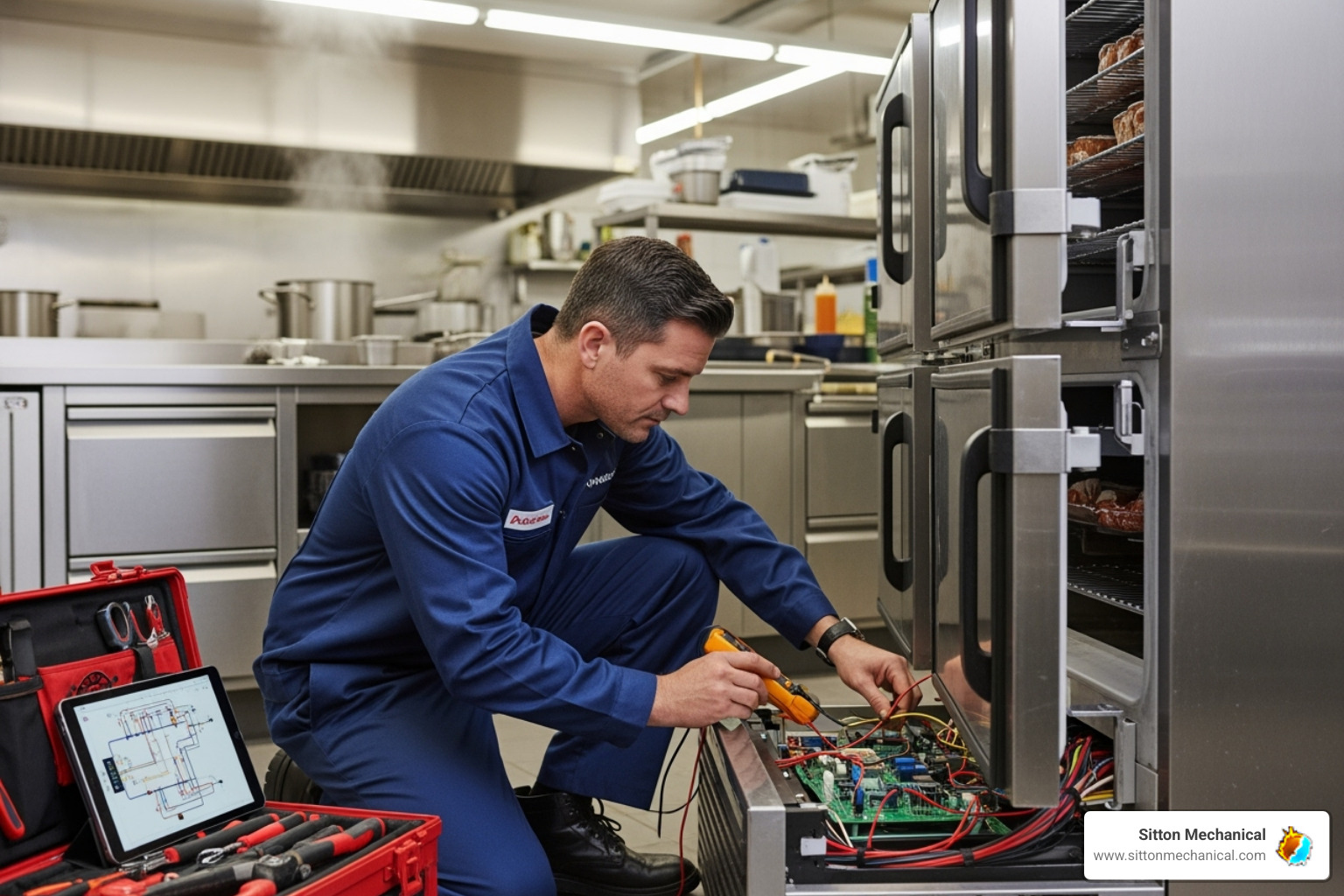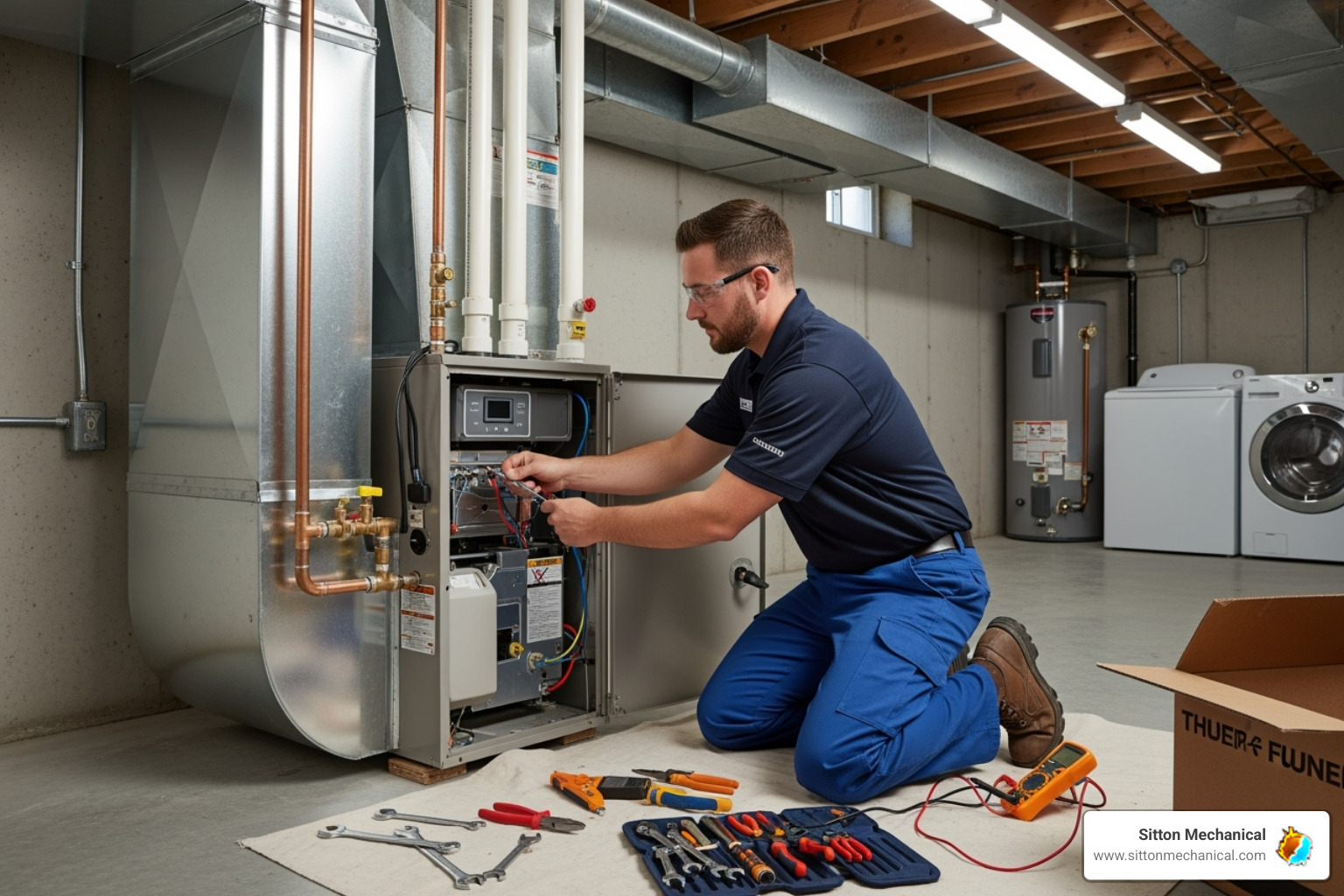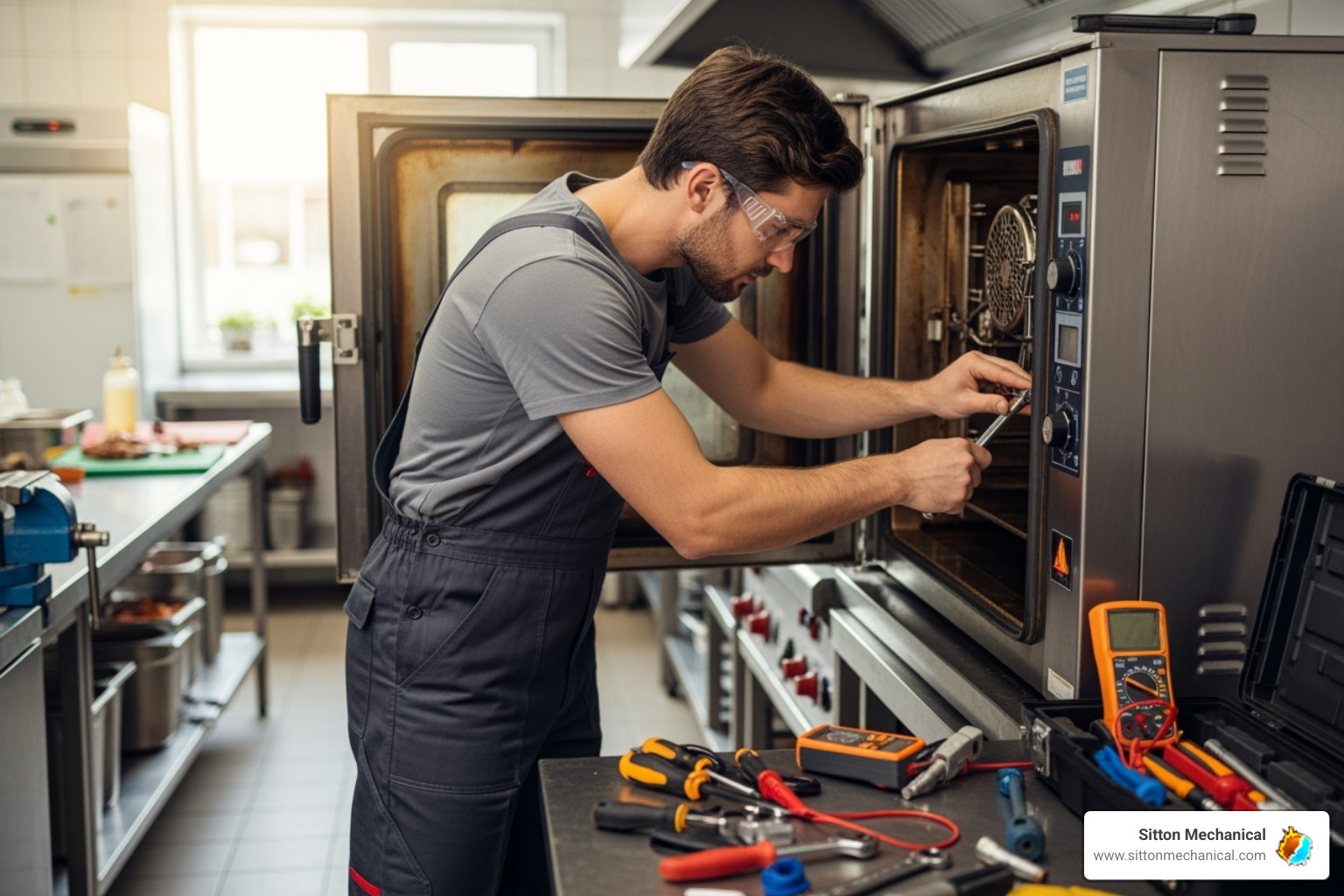Why Geothermal Heat Pump Repair Requires Expert Attention
Geothermal heat pump repair can save you thousands over a full system replacement, but only when done by certified professionals. These incredibly efficient underground systems use up to 50% less electricity than standard HVAC, but their complexity demands specialized repair knowledge.
Quick Answer for Geothermal Heat Pump Repair:
- Common signs: Higher electric bills, inconsistent temperatures, unusual noises, humidity problems
- Typical issues: Ground loop leaks, faulty compressors, clogged filters, blower motor problems
- Repair timeline: 3-4 weeks for basic repairs, up to 8 weeks for complex issues
- Professional required: Ground loops operate under pressure with specialized components
- Cost consideration: Repair if under 1/3 the cost of replacement
Geothermal systems can operate efficiently for 25 years, with underground piping lasting over 50. However, like any mechanical system, they need occasional repairs to maintain peak performance.
The key difference is the underground loop system, which makes DIY repair attempts dangerous and often unsuccessful. As one industry expert notes: "DIY geothermal system installations are never a good idea" due to the complexity involving ground loop design, utility line placement, and leak-free pipe assurance.
Understanding when to repair versus replace can mean the difference between a few thousand dollars in fixes and a $30,000 system overhaul.
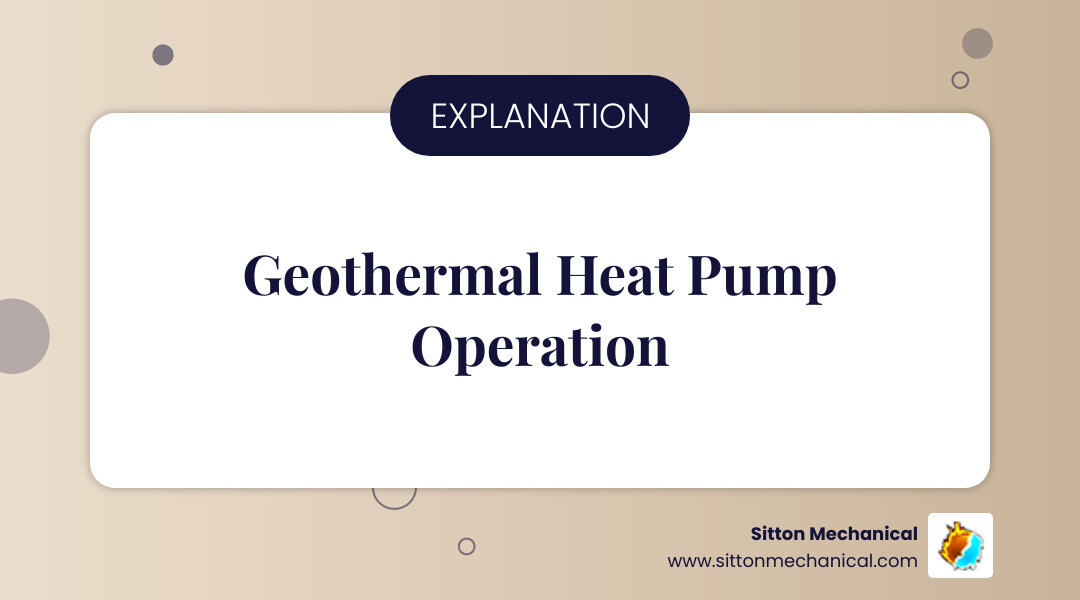
Geothermal systems are recognized by the Environmental Protection Agency (EPA) as the most energy-efficient and environmentally friendly systems for heating and cooling homes. They are durable, long-lasting, and offer significant savings—up to 70% on heating and 50% on cooling costs annually. But even these titans of efficiency can hit a snag. That's where we come in.
5 Telltale Signs Your Geothermal System Needs Repair
Your quiet, efficient geothermal system has ways of letting you know when something is wrong. Catching these warning signs early can save you from costly repairs and keep your home comfortable year-round.
Here are the key signs that your system needs professional attention: improper heating or cooling, higher electricity bills, humidity problems, unusual noises, and burning smells. Let's explore each one so you know what to watch for.
Spiking Utility Bills
When your electricity bill suddenly jumps, your geothermal system might be the culprit. It's often the first sign homeowners notice.
Your system should save you money. When bills spike, it usually means your system is working harder than it should. Maybe the backup electric heat is kicking in too often, or there's a faulty compressor that can't transfer heat efficiently.
Refrigerant coil issues are another common cause of reduced efficiency. When these components aren't working properly, your system can't move heat effectively between your home and the ground. The result? Your system runs longer and uses more electricity to achieve the same comfort level.
Even an older geothermal system should still outperform conventional heating and cooling methods. If your bills are climbing, it's time to investigate. You can learn more about how much you should be saving in our guide on Geothermal Heating and Cooling Benefits.
Inconsistent Temperatures & Airflow
Inconsistent temperatures or weak airflow from your vents are clear signs that something's not right. When your geothermal system can't maintain consistent temperatures, or when airflow seems weaker than usual, it needs attention.
Several issues can cause these problems. Blower motor failure is a big one—if the motor can't push air effectively, you'll notice weak airflow and temperature differences. Leaky underground loops can also reduce your system's overall heating and cooling capacity.
Sometimes the fix is simpler. Airflow problems can stem from something as basic as dirty air filters. When filters get clogged, they restrict air movement and force your system to work overtime. This is why regular filter changes are so important.
If you're curious about how all these components work together, check out our explanation of How Geothermal Heating Works.
Strange Noises or Smells
Your geothermal heat pump should run quietly. If it starts making noise, pay attention—it's a warning sign.
Rattling sounds usually mean something has come loose. Grinding noises are more serious and often point to mechanical problems with moving parts. These sounds are warnings that components are failing and could cause bigger problems if ignored.
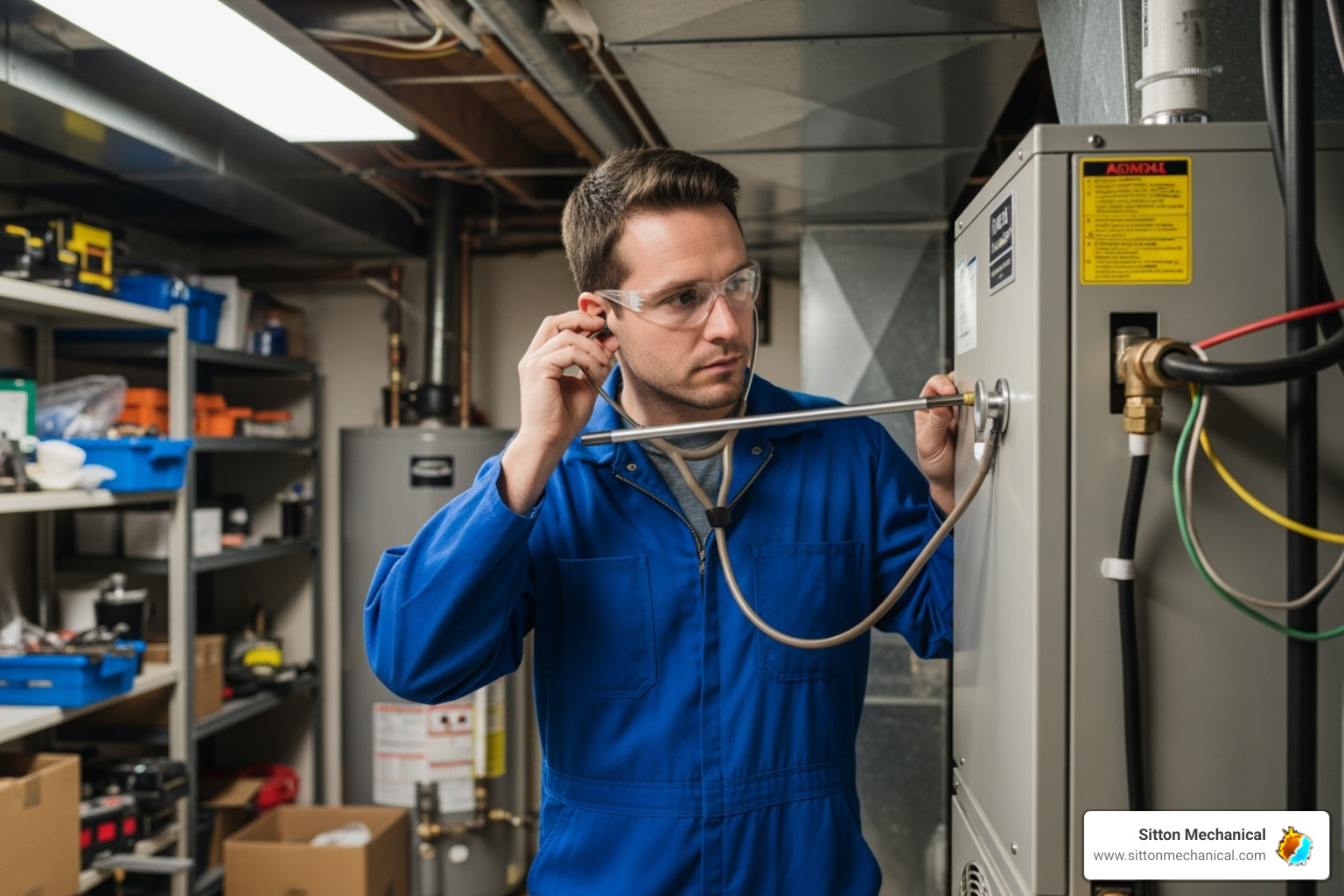
Even more concerning is a burning smell. While a slight dusty odor when your system first starts for the season is normal, a persistent burning smell could indicate electrical component failure. This is a serious safety issue.
If you smell something burning, turn off your system at the thermostat and circuit breaker, then call for professional help immediately. Electrical problems are dangerous and should never be ignored.
Problems with Humidity Control
A well-functioning geothermal system also manages humidity levels. During cooling cycles, it naturally removes excess moisture from the air, keeping your home comfortable and preventing mold growth.
When humidity control fails, you'll notice it quickly. Your home might feel sticky and uncomfortable even when the temperature is right. Or it might feel unusually dry, causing static electricity.
Improper dehumidification can happen for several reasons. Staging issues occur when your system isn't cycling correctly. Refrigerant leaks can reduce your system's ability to remove moisture. Sometimes the problem traces back to incorrect system sizing during installation.
Poor humidity control affects comfort, can impact your poor indoor air quality, and may even damage your home's furnishings. If you notice humidity problems, have a professional identify and fix the underlying cause.
Diagnosing Common Geothermal Heat Pump Problems
Understanding what might be wrong with your geothermal system helps you communicate with your technician and make informed decisions about geothermal heat pump repair. The more specific you are, the faster we can get to the root of the problem.
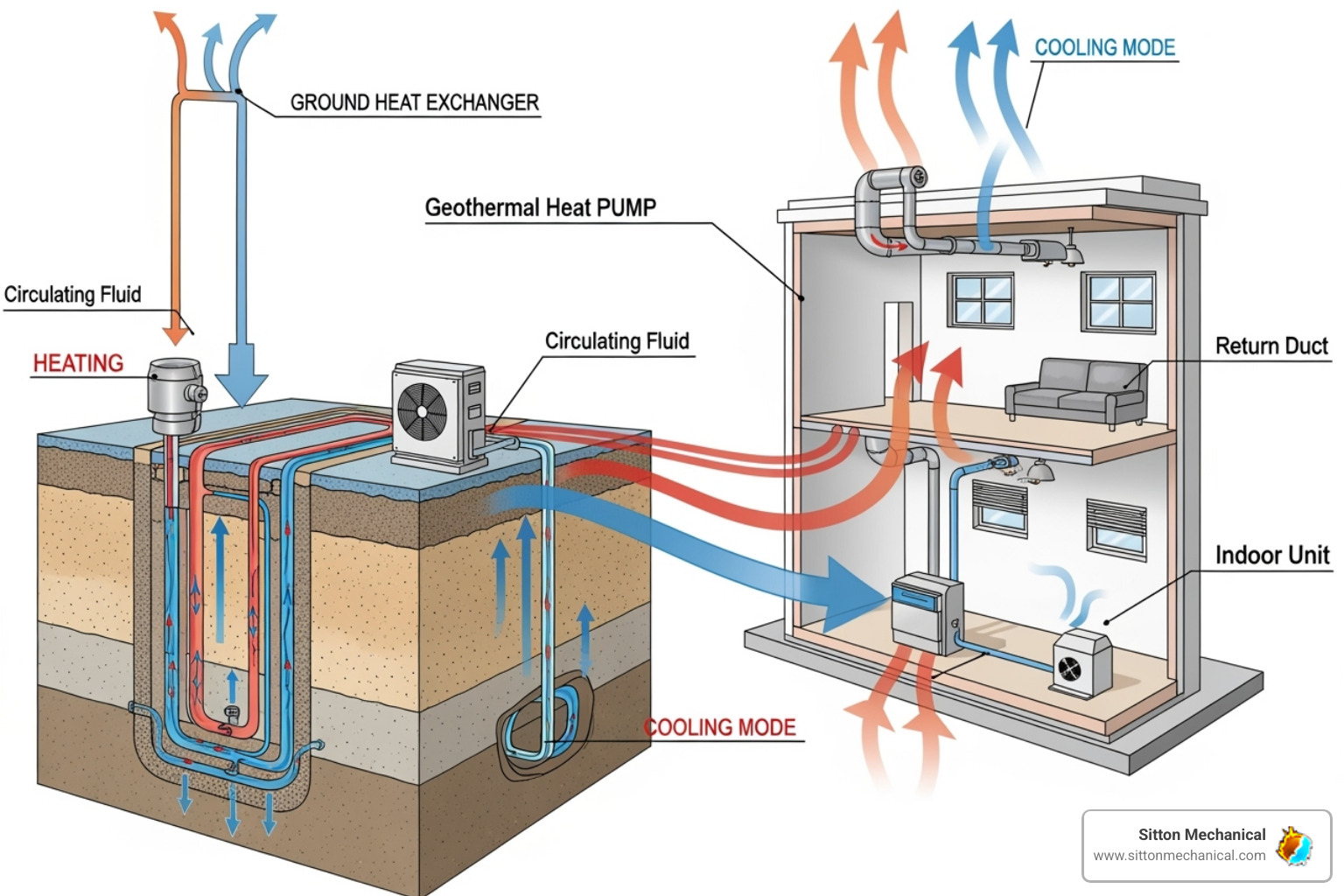
Your geothermal system has three main parts: the ground loop (underground pipes), the heat pump unit (indoor equipment), and the distribution system (ductwork). There's also a condensate drain for moisture removal. Geothermal systems—also known as water-source or geothermal heat pumps are reliable, but each component can develop issues over time.
Issues with the Ground Loop
The underground loop system needs proper pressure and flow to keep everything running smoothly. Problems here can affect your entire system's performance.
Ground loop pressure issues are common. The fluid in your underground pipes is pressurized, and over time, this pressure can drop. When that happens, the fluid can't circulate properly, and heat transfer becomes less efficient. The good news? This is usually a simple fix that involves adding a small amount of water to rebalance the pressure.
Leaks in the underground piping are less common but more serious. These problems can be hard to detect since everything's buried. You might notice water puddling in your yard, or your system's performance might gradually decline. We use detection methods like circulating an earth-safe dye through the system. If there's a leak, the dye will eventually surface, showing us where to dig. The antifreeze solution in your loops also needs the right concentration to prevent freezing and ensure proper heat transfer.
For more details on how these complex systems come together, check out our A guide to Geothermal Heat Pump Installation.
Heat Pump Component Failures
The indoor heat pump unit contains mechanical and electrical components that work hard year-round. Like parts in a car, they can wear out and need attention.
A bad pump that circulates fluid through the ground loop can bring your system to a standstill. Without proper circulation, there's no heat exchange.
The blower fan motor moves conditioned air through your ductwork. When this motor fails, you'll notice reduced airflow and hot and cold spots in your home.
Dead capacitors are like batteries that give your motors the boost they need to start. When a capacitor fails, the motor it serves won't run.
Refrigerant leaks can develop in the coils, reducing efficiency and sometimes causing ice buildup. A corroded heat exchanger is more common in older systems and affects heat transfer. Most importantly, compressor issues can severely impact your system's ability to heat and cool, often leading to high utility bills.
The Impact of Poor Maintenance
Geothermal systems are low-maintenance, but the few required tasks are critical. Neglecting them is like ignoring oil changes in your car; you'll eventually pay the price.
Clogged air filters are a common and preventable culprit behind geothermal problems. A dirty filter chokes your system, forcing it to work harder while delivering less comfort. This reduced heat transfer puts unnecessary strain on every component.
Blocked condensate drains can cause water to back up. During cooling season, your system produces condensation that needs to drain away. When algae or debris blocks these drains, you can end up with water damage, reduced efficiency, or even a complete system shutdown.
All these maintenance issues create system strain that leads to premature component failures and higher energy costs. Regular professional maintenance can prevent most of these problems. To learn more about keeping your system running smoothly, visit More about Geothermal Systems in Your Home.
The Critical Decision: Repair vs. Replace
When your geothermal system acts up, you face a big decision: repair or replace? The choice isn't always obvious and involves weighing current costs against what you'll save (or spend) down the road.
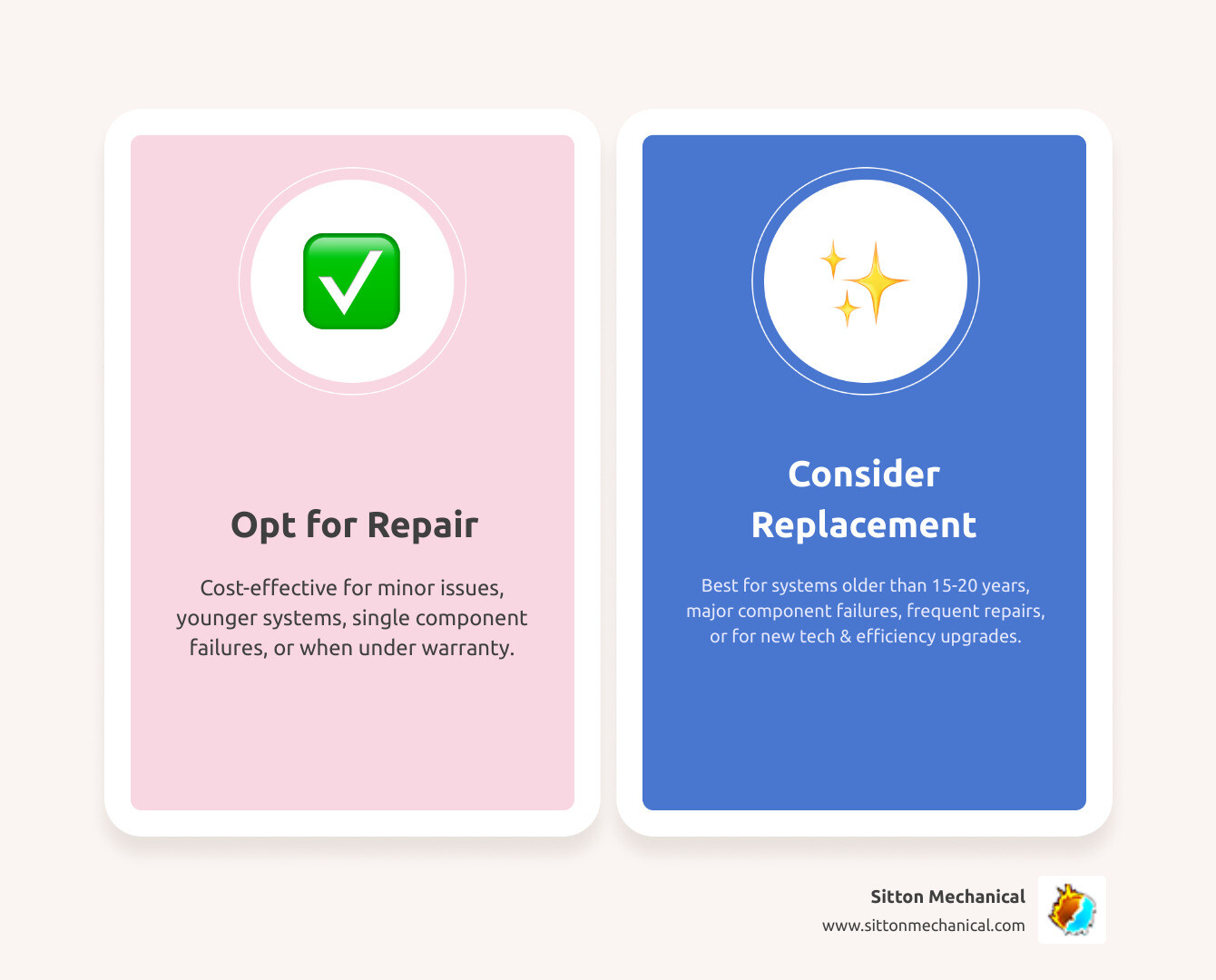
We're here to help you figure it out. This decision usually comes down to a few key factors: how old your system is, what the repair will cost, how often you've been calling for fixes, and whether you're craving better energy efficiency. Let's break it down so you can make the right choice for your home and wallet.
When to Choose Geothermal Heat Pump Repair
Most of the time, geothermal heat pump repair is your best bet, especially for minor issues. Think of it as a tune-up rather than a complete overhaul.
Repair makes the most sense when you're dealing with minor issues like a clogged filter, a dead capacitor, or a loose electrical connection. These fixes are usually straightforward and won't break the bank.
If your system is still relatively young—under 10 to 15 years old—repair is almost always the way to go. Your system still has plenty of good years ahead of it, and a well-done repair can get it back to running like new.
A helpful rule of thumb: if the repair cost is less than one-third of what a full replacement would cost, repair is usually your smartest move. When you're looking at a single component failure, like a blower motor, replacing that one part can restore your system without the expense of starting over.
Warranty coverage is another no-brainer. If the repair falls under your warranty, your out-of-pocket costs will be minimal, making repair the obvious choice.
We believe in being upfront about pricing and explaining all your options clearly. No surprises, no pressure—just honest advice to help you make the best decision.
When to Consider a Full Replacement
Though geothermal systems are built like tanks, there comes a time when replacement becomes the smarter long-term investment. Sometimes starting fresh is the most economical choice.
Age is a big factor. While underground loops can work for over 50 years, the indoor heat pump unit typically lasts about 20 to 25 years. If your system is pushing past 15 to 20 years old, major component failures become more likely.
Major component failures can change the math. When critical parts like the compressor or heat exchanger fail, the repair bill can be substantial. At that point, replacement often makes more financial sense.
If your system needs attention every few months, it's a classic sign that it has reached the end of its reliable life. Frequent repairs and accumulating bills mean it may be better to invest in something dependable.
Obsolete technology is another consideration. Newer systems offer improved efficiency and features, and your older system might be costing you money every month.
Even if you simply want higher efficiency, replacement might appeal to you. Today's models can offer even greater long-term savings and environmental benefits than older geothermal units.
We'll help you look at the total cost of ownership, including potential future repairs, to decide whether repair or replacement is your best path. For a deeper understanding of what modern geothermal systems offer, check out our complete Geothermal Heating Guide.
The Importance of Professional Geothermal Heat Pump Repair
Here's the truth about geothermal heat pump repair: it's not a weekend DIY project. These complex machines require specialized knowledge and tools. Your geothermal system deserves professional care.

These systems interact with your home's electrical system, plumbing, and the earth itself. Our certified technicians at Sitton Mechanical have spent years learning the ins and outs of these sophisticated systems. We understand how pressurized ground loops work, how to safely handle high-voltage components, and the precise techniques for refrigerant handling.
When you call us, you're not just getting a repair—you're getting peace of mind. Our technicians arrive with specialized tools and the ground loop expertise that comes from years of hands-on experience.
Why DIY Repair is a Bad Idea
We get it; saving money is always tempting. But geothermal systems have unique challenges that make DIY repairs genuinely dangerous.
First, those pressurized loops operate under significant pressure. One wrong move can create expensive leaks. The high-voltage components in your heat pump are also unforgiving and can cause injury or fire if handled incorrectly.
Then there's refrigerant handling. This isn't just about doing the job right—it's about following EPA regulations. Improper handling can harm the environment and land you in legal trouble. Plus, most DIY attempts end up voiding warranties, meaning you'll pay full price for future repairs.
Many "simple" geothermal problems are actually symptoms of bigger issues that only experienced professionals can properly diagnose. The EPA recognizes geothermal heat pumps as the most energy-efficient system, but that efficiency depends on everything working together perfectly.
Crucial Maintenance to Prevent Repairs
The good news is you can do a lot to keep your geothermal system running smoothly and avoid major repairs. A little prevention goes a long way.
Annual tune-ups are your system's best friend. During these visits, our technicians check fluid levels, clean coils, inspect electrical connections, and catch small problems before they become expensive headaches.
Filter changes are one task you can—and should—handle yourself. Every one to three months, swap out that filter. A dirty filter makes your whole system work harder and less efficiently.
Don't forget about condensate drain inspection. At the start of each cooling season, check to make sure water is flowing freely. A clogged drain can shut down your system on the hottest day of the year.
We also recommend professional inspections every few years to check the underground components you can't see. It's much cheaper to catch a small ground loop issue early than to deal with a major failure later.
Following these steps, along with the guidance in our resource about Learn more about Geothermal Heating, will keep your system running efficiently for decades. Geothermal systems can last 25 years or more with proper care.
Frequently Asked Questions about Geothermal Repair
We get a lot of questions about geothermal systems, especially when homeowners face their first repair. These are some of the most common concerns we hear.
How long does a geothermal system last?
One of the best things about geothermal is that these systems are built to last. Your indoor unit will typically serve you for 20 to 25 years—significantly longer than conventional HVAC systems, which usually need replacement after 10-15 years.
The real champion is your ground loop. Those underground pipes are designed to last over 50 years, and many will outlive the home they're installed in.
The key to reaching these impressive lifespans is proper maintenance. Regular tune-ups and simple tasks like changing filters help both your indoor unit and ground loop reach their full potential. The component durability in geothermal systems is remarkable when they're properly cared for.
How does a dirty air filter affect my geothermal system?
A dirty air filter can cause a surprising amount of trouble. It's one of the most common issues we see and creates a domino effect of problems.
When your filter gets clogged, it creates restricted airflow throughout your system. This forces your geothermal heat pump to work overtime to move air, leading to reduced efficiency and higher energy bills.
The strain doesn't stop there. System overheating becomes a real concern, especially for components like the blower motor. When your system can't "breathe" properly, it runs hotter and works harder than it should.
Perhaps most frustrating is the increased energy use combined with reduced comfort. With less air flowing over the coils, your system can't transfer heat effectively, leaving you with uneven temperatures.
This is completely preventable with regular filter changes every 1-3 months!
Can a geothermal system leak?
Yes—geothermal systems can develop leaks, though they're relatively uncommon due to robust engineering. When they do occur, there are several types to be aware of.
Ground loop leaks are what most homeowners worry about. While the piping is durable, factors like ground shifting or improper installation can cause problems. These leaks are usually slow—you might notice unexplained water puddling in your yard. We use specialized techniques, like circulating earth-safe dye through the system, to pinpoint leaks.
Inside your home, gasket leaks can develop over time. Gaskets that seal fluid lines can degrade or corrode, leading to slow leaks.
Refrigerant leaks work similarly to those in traditional air conditioners. They can occur in refrigerant lines or coils and will reduce your system's capacity.
Finally, condensate drain clogs aren't technically leaks, but they can cause water to back up and overflow from the drain pan, leading to water damage or a system shutdown as a safety measure.
Catching any of these issues early is important. Quick detection and professional geothermal heat pump repair can prevent small problems from becoming major headaches!
Your Local Geothermal Experts
We hope this guide helped you understand the benefits of geothermal systems and when they need professional attention. Recognizing the warning signs and knowing when to call for geothermal heat pump repair is key to keeping them running smoothly for maximum efficiency and savings.
When your geothermal system shows those telltale signs we discussed—spiking utility bills, inconsistent temperatures, strange noises, or humidity problems—you need experts who truly understand these sophisticated systems. That's where we come in.
At Sitton Mechanical, we've been your trusted partners in home comfort for over 10 years. Our screened and certified technicians are specialists in diagnosing and repairing all brands of geothermal systems. We know these systems inside and out, from the underground loops to the indoor components.
What sets us apart? We believe in upfront pricing—no surprises or hidden fees. Our work comes with a guarantee, and we offer flexible financing options to make sure our reliable, on-time service fits your budget.
Whether you're dealing with a ground loop leak, a faulty compressor, or just need an annual tune-up, we're here to help. We serve homeowners throughout Oklahoma, including Stillwater, Perkins, Morrison, Glencoe, Perry, Cushing, Mulhall, Orlando, Ripley, and Sumner.
Your geothermal system is an investment in your home's comfort and efficiency. Don't let small problems become expensive headaches. For expert diagnosis and reliable residential geothermal services in Perkins, OK, contact our certified team today.
Let us help you keep your geothermal system running strong for years to come. When you've invested in the most energy-efficient heating and cooling system available, you deserve service that matches that excellence.
Ready to Transform Your Home?




